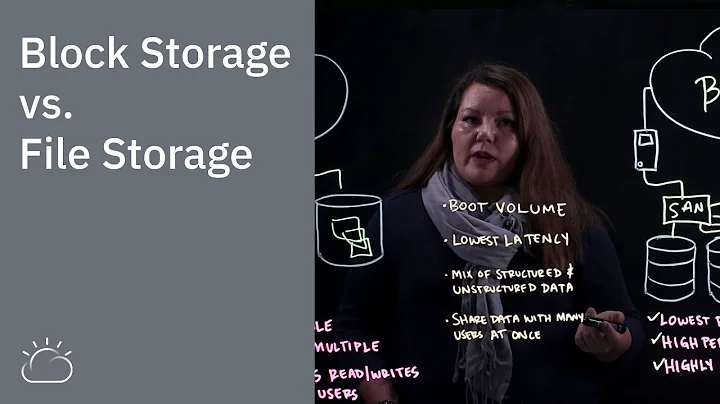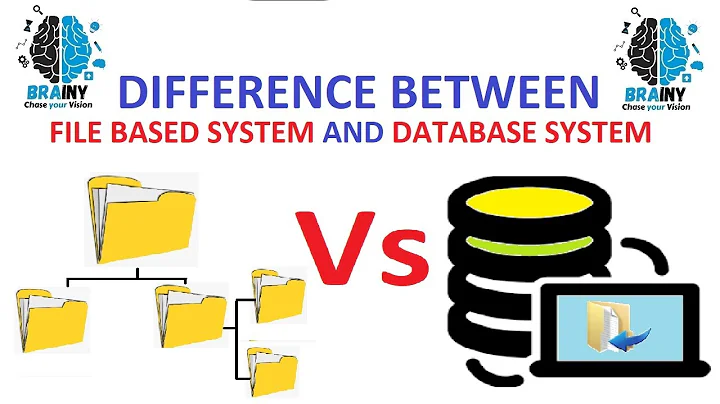Storing a file in a database as opposed to the file system?
Solution 1
Have a look at this answer:
Storing Images in DB - Yea or Nay?
Essentially, the space and performance hit can be quite big, depending on the number of users. Also, keep in mind that Web servers are cheap and you can easily add more to balance the load, whereas the database is the most expensive and hardest to scale part of a web architecture usually.
There are some opposite examples (e.g., Microsoft Sharepoint), but usually, storing files in the database is not a good idea.
Unless possibly you write desktop apps and/or know roughly how many users you will ever have, but on something as random and unexpectable like a public web site, you may pay a high price for storing files in the database.
Solution 2
If you can move to SQL Server 2008, you can take advantage of the FILESTREAM support which gives you the best of both - the files are stored in the filesystem, but the database integration is much better than just storing a filepath in a varchar field. Your query can return a standard .NET file stream, which makes the integration a lot simpler.
Getting Started with FILESTREAM Storage
Solution 3
I'd say, it depends on your situation. For example, I work in local government, and we have lots of images like mugshots, etc. We don't have a high number of users, but we need to have good security and auditing around the data. The database is a better solution for us since it makes this easier and we aren't going to run into scaling problems.
Solution 4
What's the question here?
Modern DBMS SQL2008 have a variety of ways of dealing with BLOBs which aren't just sticking in them in a table. There are pros and cons, of course, and you might need to think about it a little deeper.
This is an interesting paper, by the late (?) Jim Gray
To BLOB or Not To BLOB: Large Object Storage in a Database or a Filesystem
Solution 5
In my own experience, it is always better to store files as files. The reason is that the filesystem is optimised for file storeage, whereas a database is not. Of course, there are some exceptions (e.g. the much heralded next-gen MS filesystem is supposed to be built on top of SQL server), but in general that's my rule.
Related videos on Youtube
Comments
-
Phil Price over 3 years
Generally, how bad of a performance hit is storing a file in a database (specifically mssql) as opposed to the file system? I can't come up with a reason outside of application portability that I would want to store my files as varbinaries in SQL Server.
-
 Dave Van den Eynde over 14 yearsI don't see anywhere mentioned that this "file" needs to be written to disk and read again.
Dave Van den Eynde over 14 yearsI don't see anywhere mentioned that this "file" needs to be written to disk and read again. -
 Dave Van den Eynde over 14 yearsI'm having some reservations here. Specifically the scalability and availability side of things: how do you control where those "blobs" are stored?
Dave Van den Eynde over 14 yearsI'm having some reservations here. Specifically the scalability and availability side of things: how do you control where those "blobs" are stored? -
 Jon Limjap over 14 yearsThis is an implicit task when images have to be displayed afterward, especially when stored in different formats or in scenarios where they can't be held in memory for lenghty periods of time, by virtue of sheer size.
Jon Limjap over 14 yearsThis is an implicit task when images have to be displayed afterward, especially when stored in different formats or in scenarios where they can't be held in memory for lenghty periods of time, by virtue of sheer size. -
Michal Sznajder over 14 yearsScalability and availability seem to have been pretty well thought through - see this whitepaper: msdn.microsoft.com/en-us/library/cc949109.aspx
-
Sven Grosen over 10 yearsOne caveat to this is that you have to use integrated security (i.e. Windows authentication) when connecting to the database: blogs.msdn.com/b/psssql/archive/2008/04/10/…
-
 ubiquibacon over 7 yearsWhat do you consider a small or large file?
ubiquibacon over 7 yearsWhat do you consider a small or large file?








